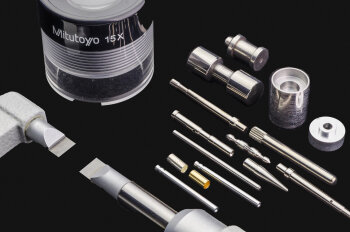
Precision turned parts play a critical role in virtually every industry - from aerospace and automotive to medical, hydraulic, and electronic applications. These small but vital micro parts are an essential part of countless mechanical systems, where accuracy, repeatability, and performance are essential.
What Are Precision Turned Parts?
Precision turned parts are components manufactured using CNC lathes or automatic screw machines to achieve tight tolerances and high surface quality. They are called “turned” parts because the manufacturing process involves rotating a bar of material while a cutting tool shapes it — a process known as turning.
These parts are typically cylindrical or round in shape, though advanced CNC lathes can produce complex geometries with flats, grooves, threads, or cross-holes. Examples include:
- Hydraulic fittings and connectors
- Fasteners, shafts, and pins
- Bushings, spacers, and couplings
- Medical and dental components
- Precision inserts for electronics
How Precision Turning Works
The precision turning process combines computer-controlled automation with accurate tooling to produce parts that meet exact dimensional requirements. Here are the basics of precision turning:
- Precision Part Material Selection and Preparation
The process begins with bar stock - usually stainless steel, brass, aluminum, titanium, or specialized alloys. The material choice depends on the part’s strength, corrosion resistance, and end-use application. - Programming and Setup
CNC software translates the part’s 3D CAD design into a series of precise machine instructions. These commands control spindle speeds, feed rates, and cutting paths, ensuring consistent, repeatable production. - Part Turning and Cutting
The bar stock rotates at high speed while stationary cutting tools remove material to achieve the desired dimensions. On multi-axis lathes or Swiss machines, several tools can work simultaneously to perform drilling, milling, and threading in one cycle. - Finishing and Quality Control
Once machining is complete, parts undergo deburring, cleaning, and inspection using coordinate measuring machines (CMM) or optical comparators. This ensures every piece meets tolerance, surface finish, and dimensional requirements.
Benefits of Precision Turned Parts
There are many benefits of precision turned parts - most notably their ability to deliver tight tolerances, repeatable accuracy, and exceptional consistency across high-volume production runs.
- Exceptional Accuracy and Consistency
CNC turning achieves tolerances as tight as ±0.0001 inches, ensuring each component performs reliably in demanding environments — from aircraft engines to surgical instruments. - Efficiency for High-Volume Production
Once a part is programmed, the CNC machine can run continuously, often unattended, for high-volume production with minimal waste and consistent quality. - Versatility Across Materials and Designs
Modern precision turning centers can handle an extensive range of materials — metals, plastics, and exotic alloys — and create intricate shapes that would be difficult or impossible using conventional machining methods. - Superior Surface Finishes
Precision turning delivers fine surface finishes that often eliminate the need for additional grinding or polishing, reducing both time and cost. - Reduced Lead Times
Automation and simultaneous multi-tool operation enable faster cycle times and quick turnarounds — essential for just-in-time (JIT) manufacturing and tight project deadlines. - Cost-Effective for Complex Components
While initial programming can be detailed, the efficiency of CNC machining makes it cost-effective for both prototype development and full-scale production runs.
Industries That Rely on Precision Turned Parts
Precision turned parts play a critical role across a wide range of industries that demand accuracy, durability, and consistent performance.
- Aerospace & Defense: Lightweight, high-tolerance components that can withstand extreme stress.
- Medical & Dental: Surgical and implant components requiring biocompatibility and flawless finishes.
- Automotive: Engine, brake, and transmission components with tight dimensional accuracy.
- Gauges & Instrumentation: High-pressure fittings and connectors that demand leak-free precision.
- Electronics: Miniature connectors and housings requiring fine detail and repeatability.
Through advanced CNC technology and expert craftsmanship, manufacturers can produce components that meet the strictest quality standards - every time. Whether you’re designing for aerospace, medical, or industrial applications, precision turned components ensure your equipment runs efficiently and dependably. When accuracy matters, turning to precision machining is the smart choice.

